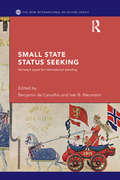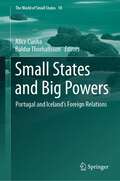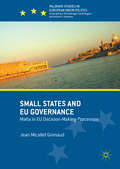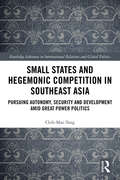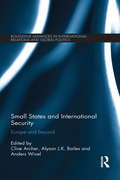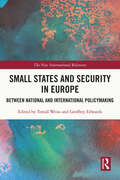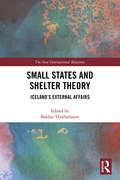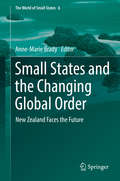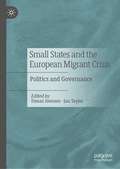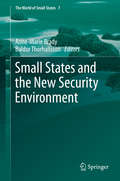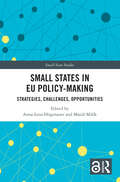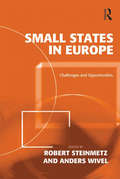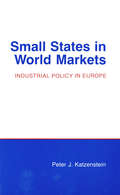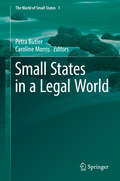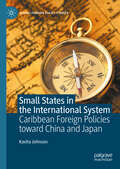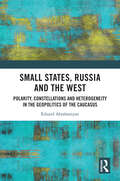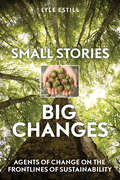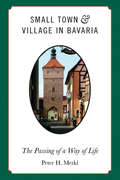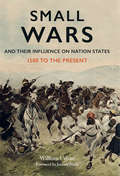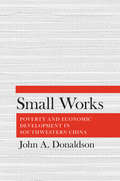- Table View
- List View
Small State Status Seeking: Norway's Quest for International Standing (New International Relations)
by Iver B Neumann Benjamin De CarvalhoStatus-seeking is an important aspect of the foreign policies of a number of small states, but one that has been rarely studied. This book aims to contribute to our understanding not only of status-seeking, by coming at that question from a new angle, that of a small state, but also to our understanding of foreign policy, by discussing the importance of status for foreign policy overall. If status is a hierarchy, then it is important to focus not just on the highest-ranking powers, but also those at lower levels. As the distribution of power is becoming more diffuse, the role of small and medium powers becomes more significant than it was during the Cold war. The book chapters go beyond familiar explications of "soft power" or conflict resolution to highlight new aspects of Norway’s foreign policy, including contributions to national defense, global warming, and management of Arctic resources. This book will be of interest to students and scholars in areas including US Foreign Policy, International Relations and European Politics.
Small States and Big Powers: Portugal and Iceland’s Foreign Relations (The World of Small States #10)
by Baldur Thorhallsson Alice CunhaForeign policy is one of the most complex policies of every state, and Portugal and Iceland are no exception. The “Small States and Big Powers: Portugal and Iceland’s Foreign Relations” book analyses the importance of relations with big powers or regional and international organisations from a shelter theory perspective, detailing the degree of political, economic and societal shelter that they have provided to Portugal and to Iceland over time. Despite having followed distinct paths, Portugal and Iceland have some important similarities in their foreign policy, namely in relation to the European and the Atlantic dimensions and their participation in regional organisations. The book examines their decisions to join or not to join regional organisations, and both countries’ bilateral relations with other important parts of the world, namely Africa, the Nordic states and China. This book compares the foreign policies of Portugal and Iceland considering their commonly identified status as small states and place them within the shelter theory framework, and its findings indicate that both countries need to balance their international relations with shelter provided by different actors. Their size and political and economic capabilities matter in their bilateral and multilateral relations. It is therefore in both countries’ interest to maintain strong cooperation not only with big powers, but also regional and international organisations, depending on their field of action, in order to flourish politically, economically and socially.
Small States and EU Governance
by Jean Micallef GrimaudThis book examines a crucial question about small states and their governments' influence in the European Union (EU) decision-making processes. - Are EU small member state governments influential in EU decision-making processes? In other words, do they exercise influence in these processes? And if so, how and at which stage do they do this? This book seeks to answer the above questions by focusing on Malta - the smallest state in the EU - and whether it exercises influence in 'uploading' its preferences in two distinct stages of EU legislative decision-making processes - decision-shaping (formation) and decision-taking (adoption). The cases selected and analyzed showcase the Maltese government's behaviour in legislative negotiations in differing EU policy spheres that are extremely relevant to it. These are the adoption of EU directives on pyrotechnic articles (falling under the EU competition and consumer health and safety policy spheres) and on the extension of EU long-term residence to beneficiaries of international protection (falling under EU immigration policy). As analyzed in the latter chapters of the book, Malta's government has achieved varying degrees of success in its exercise of influence in these EU decision-making processes.
Small States and Hegemonic Competition in Southeast Asia: Pursuing Autonomy, Security and Development amid Great Power Politics (Routledge Advances in International Relations and Global Politics)
by Chih-Mao TangIn the last few decades, Southeast Asia has become generally more peaceful and more prosperous, with progress in economic development, regional cooperation and integration. ASEAN in particular plays a leading role within and beyond the region in promoting multilateral cooperation in both security and economic matters. All these developments progress amid increasing hegemonic competition between the US and China for regional dominance in the Asia-Pacific region. According to the realist viewpoint of international politics, Southeast Asian states can do nothing but choose sides at the expense of international political autonomy in order to maintain their national interests. Tang argues, however, that in fact there exists an opportunity for Southeast Asian states to simultaneously reinforce their military security, economic development and international political autonomy in face of the US-China hegemonic competition. Drawing on the ideas of power transition theory and recent works of capitalist peace, Tang argues that small states can exploit the competition between great powers to make economic gains and ensure security while maintaining their autonomy. He outlines the necessity of cooperation among these small states and of economic liberalization for the effectiveness of this reinforcing dynamics, applying policy and econometric analyses to a wide range of qualitative and quantitative data.
Small States and International Security: Europe and Beyond (Routledge Advances in International Relations and Global Politics)
by Clive Archer Anders Wivel Alyson J.K. BailesThis book explains what ‘small’ states are and explores their current security challenges, in general terms and through specific examples. It reflects the shift from traditional security definitions emphasizing defence and armaments, to new security concerns such as economic, societal and environmental security where institutional cooperation looms larger. These complex issues, linked with traditional power relations and new types of actors, need to be tackled with due regard to democracy and good governance. Key policy challenges for small states are examined and applied in the regional case studies. The book deals mainly with the current experience and recent past of such states but also offers insights for their future policies. Although many of the states covered are European, the study also includes African, Caribbean and Asian small states. Their particular interest and relevance is outlined, as is the connection between their security challenges and their smallness. Policy lessons for other states are then sought. The book is the first in-depth, multi-continent study of security as an aspect of small state governance today. It is novel in placing the security dilemmas of small states in the context of wider ideas on international and institutional change, and in dealing with non-European states and regions.
Small States and Security in Europe: Between National and International Policymaking (New International Relations)
by Geoffrey Edwards Tomáš WeissThis book studies how domestic contestation influences the security policy of small states within the European Union (EU) and North Atlantic Treaty Organization (NATO). A multinational group of expert contributors consider how domestic contestation is translated into small states’ foreign policies, how membership of international organisations alters attitudes to security policy in small states and how patterns of small states’ behaviour across domestic traditions, security cultures and geographical location can be identified. Anchored in new institutionalism, the book explores the influence of international organisations on security policies and the tensions created by connecting four strands of literature, on Europeanisation, on the impact of and on institutions, on the way foreign and security policy is made, and the security/strategic culture of small states. It will be of interest to all scholars and students of international relations, security studies, EU studies, area studies and politics.
Small States and Shelter Theory: Iceland’s External Affairs (New International Relations)
by Baldur ThorhallssonSmall states are dependent on the economic, political, and societal shelter provided by larger states and international organizations to survive and prosper. Iceland provides an ideal case study for shelter theory, due both to its smallness as compared with its larger neighbouring states, as well as its status as both an entity and then as a state. That Iceland has historically been so isolated, relative to other small European states, also makes it easier to trace the country’s interactions with other actors, since the impact of each interaction can be measured more definitively thus broadening the theory’s validity and offering new insights into its operations. The contributors to this volume focus on the extent of Iceland’s external engagement with other states and the domestic consequences of this interaction. Societal shelter, in terms of transfer of norms and values, is as of much importance as economic and political shelter. By unpacking the structure of Iceland’s external relations, this book demonstrates both the size-related disadvantages and the unique needs of small states to evaluate, explain, and predict small state behaviour. This book will be of interest to all scholars in international relations, especially those interested in small state behaviour.
Small States and the Changing Global Order: New Zealand Faces the Future (The World of Small States #6)
by Anne-Marie BradyThis book provides a critical examination of the foreign policy choices of one typical small state, New Zealand, as it faces the changing global balance of power. New Zealand’s foreign policy challenges are similar with those faced by many other small states in the world today and are ideally suited to help inform theoretical debates on the role of small states in the changing international system. The book analyses how a small state such as New Zealand is adjusting to the changing geopolitical, geo-economic, environment. The book includes perspectives from some of New Zealand's leading as well as emerging commentators on New Zealand foreign policy.
Small States and the European Migrant Crisis: Politics and Governance
by Ian Taylor Tómas JoensenThis edited book examines the experience of small states in Europe during the 2015–2016 migration crisis. The contributions highlight the challenges small states and the European Union faced in addressing the massive irregular flow of migrants and refugees into Europe and the Schengen Area. Small states adopted a number of coping strategies and proved relatively effective in navigating the storm they faced. Externally they pursued strategies of shelter-seeking, hiding, hedging and norm entrepreneurship, while domestically they tended to securitize migration and to pursue scapegoating by blaming the EU and other states for the nature and magnitude of the crisis. During this crisis management, their small administrations proved resilient and flexible in their responses, despite suffering from limited resources and being subject to the shifting preferences of stronger actors. This book shows that independent of whether we view the migration crisis as a crisis for the European Union or Europe as a whole, or how we interpret the intensity and severity of the crisis, this was a crisis for small states in Europe. The crisis disrupted the liberal and institutionalized order upon which small states in the region had increasingly based their policies and influence for more than 60 years.
Small States and the New Security Environment (The World of Small States #7)
by Anne-Marie Brady Baldur ThorhallssonThis book examines the security, defence and foreign policy choices and challenges of small states in NATO and its small partner states in the new security environment. The main aim of the book is to analyse how these states are dealing with current and emerging security challenges and how they might better prepare for these challenges. A special focus is on ‘new’ security threats and solutions, such as drones and hybrid warfare. Simultaneously, the book focusses on how small states are responding to emerging ‘old threats’, such as Russian aggression in its neighbouring states and increased activity in the North Atlantic. The book makes an attempt to answer questions like: How are the small states of NATO and its small partner states adjusting to the new geo-political and geo-economic environment? Do small states in NATO manage the tension between alliance commitments differently from small states that are not members of NATO? What are the core strategic interests of the NATO and non-NATO partner small states? The book is about the external dimension of inherent size-related difficulties in states and how small states compensate for their inbuilt structural weaknesses compared with their larger neighbouring states. One third of the member states of NATO are small and most NATO partner states are small states too. Small states frequently have a disproportionate effect on global politics and they are more often affected by global shifts of power, yet they have less resources available to address security challenges. The aim of the book is to enhance the understanding of the role of small states in the changing global international security environment. The book presents the theory of shelter (which is derived from the diverse and extensive literature on small states) and uses it to examine how small states respond to new and old security threats. Shelter theory addresses three interrelated issues of common concerns to small states: the reduction of risk before a possible crisis event, assistance in absorbing shocks in times of crises, and help in recovering after such an event. In short, shelter theory claims that small states need external shelter in order to survive and prosper. They are dependent on the economic, political, and societal shelter provided by larger states, as well as regional and international organizations.
Small States in EU Policy-Making: Strategies, Challenges, Opportunities (Small State Studies)
by Anna-Lena Högenauer and Matúš MišíkSmall States in EU Policy-Making analyses how small states try to impact European Union policy-making through a range of strategies.With the last rounds of enlargement and Brexit, the number and weight of small states in the European Union have steadily increased. At the same time, small states face distinct challenges in different institutions, which may impact their strategies. Nonetheless, the existing literature primarily focuses on the Council of the European Union and the European Council and offers few insights into how small states navigate the other institutions. The contributions to this volume examine how small states can wield influence in different institutions, arguing that they do indeed pursue different strategies depending on institutional context. The policy case studies on the EU’s foreign and security policies confirm these findings: small states can have influence in EU policy-making and can create situations where their needs are met. They are most likely to succeed when they build foreign policy coalitions, when they anticipate major economic developments and when they manage to acquire a high level of expertise in a policy area. However, the case studies also show that there is a risk of small states becoming policy-takers in cases where they cannot provide leadership in terms of ideas and expertise and/or fail to build political weight through coalitions.This book will be of interest to academics and practitioners of European politics and the EU in particular, as well as policy-makers and practitioners working on small states.The Open Access version of this book, available at http://www.taylorfrancis.com, has been made available under a Creative Commons Attribution-Non Commercial-No Derivatives (CC-BY-NC-ND) 4.0 license.
Small States in Europe: Challenges and Opportunities (Europe And The Nation State Ser.)
by Robert SteinmetzThe effects of recent institutional change within the European Union on small states have often been overlooked. This book offers an accessible, coherent and informative analysis of contemporary and future foreign policy challenges facing small states in Europe. Leading experts analyze the experiences of a number of small states including the Netherlands, the Czech Republic, Slovakia, Luxembourg, Cyprus, Iceland, Austria and Switzerland. Each account, written to a common template, explores the challenges and opportunities faced by each state as a consequence of EU integration, and how their behaviour regarding EU integration has been characterized. In particular, the contributors emphasize the importance of power politics, institutional dynamics and lessons of the past. Innovative and sophisticated, the study draws on the relational understanding of small states to emphasize the implications of institutional change at the European level for the smaller states and to explain how the foreign and European policies of small states in the region are affected by the European Union.
Small States in World Markets: Industrial Policy in Europe
by Peter J. KatzensteinBy the early 1980s the average American had a lower standard of living than the average Norwegian or Dane. Standards of living in the Netherlands, Belgium, Sweden, Switzerland, and Austria also rivaled those in the United States. How have seven small democracies achieved economic success and what can they teach America? In Small States in World Markets, Peter Katzenstein examines the successes of these economically vulnerable nations of Western Europe, showing that they have managed to stay economically competitive while at the same time preserving their political institutions. Too dependent on world trade to impose protection, and lacking the resources to transform their domestic industries, they have found a third solution. Their rapid and flexible response to market opportunity stems from what Katzenstein calls "democratic corporatism," a mixture of ideological consensus, centralized politics, and complex bargains among politicians, merest groups, and bureaucrats. Democratic corporatism is the solution these nations have developed in response to the economic crises of the 1930s and 1940s, the liberal international economy established after World War II, and the volatile markets of more recent years. Katzenstein maintains that democratic corporatism is an effective way of coping with a rapidly changing world, a more effective way than the United States and several other large industrial countries have yet managed to discover.
Small States in a Legal World
by Caroline Morris Petra ButlerThis book is a unique collection of high quality articles analysing legal issues with particular regard to small states. The small states of the world differ considerably in their geography, history, political structures, legal systems and wealth. Nevertheless, because of their size, small states face a set of common challenges including vulnerability to external economic impacts such as changing trade regimes and limited ability to diversify economic activity; limited public and private sector capacity, including the legal and judicial infrastructure; a need for regional co-operation; a vulnerability to environmental changes as well as a limited ability to engage with supranational bodies and the forces of globalisation. This is the first volume of an exciting and unique new series, The World of Small States. In this work, legal experts from small jurisdictions and those with a particular interest in legal issues facing small states explore inter alia ethics in small jurisdictions, legal education and the profession in small states, the challenges facing small states with mixed legal systems, the constitutional arrangements in small states, small states as tax havens, and intellectual property and competition law issues.
Small States in the European Union: Coping with Structural Disadvantages
by Diana PankeThe most recent EU-enlargements have considerably increased the number of small member states. In the EU-27, 19 countries have fewer votes in the Council of Ministers than the EU-average. These small states face a series of size-related disadvantages in day-to-day EU negotiations. Against this backdrop the book asks: are some small states better at coping with structural disadvantages than others? How active are small states in participating in day-to-day EU negotiations and why do some states use negotiation strategies more frequently than others? Under which conditions are the different negotiation strategies effective and when can small states punch above their weight? Based on more than 100 interviews with policy-makers and an analysis of a unique database on the negotiation activities of EU member states, this book explains how active participation is essential for the shaping success of small states and shows that small states are more influential with persuasion-based rather than bargaining-based strategies. Two case studies on the pesticides and the spirit drinks regulations further reveal that persuasion strategies are especially effective if the arguments match the nature of the issue at stake and resonate well with prior beliefs of addressees. No other study comprehensively analyzes small states in a comparative perspective, examines their activity levels in EU negotiations and outlines which conditions are needed for the effectiveness of a broad range of strategies. An indispensable resource for students and researchers interested in how and under which conditions small states can influence policies in negotiations beyond the nation-state.
Small States in the International System: Caribbean Foreign Policies toward China and Japan (Global Foreign Policy Studies)
by Kavita JohnsonThis book will explore the reorientation of the foreign policy direction of the Caribbean from traditional partners in the western hemisphere towards partners in the Asia-Pacific region. In particular, it will examine the Caribbean’s interest in increasing its engagement with China and Japan and will also investigate the opportunities and challenges for Caribbean states to deepen relations with these two countries. Opportunities include economic assistance, investments, diversification of trading partners and infrastructural development. However, with these benefits are disadvantages which relate to certain conditionalities attached to economic assistance, a widening trade deficit and on amore domestic level, challenges to regional integration which can hinder the extent and direction of these relationships. The book will also examine the main motivations behind China and Japan’s interest in the Caribbean region, premised on the argument that they are based on economic development, political security and global status. Case studies will be presented examining inter alia,the “One China Policy” in the region. As China continues to rise to power, Japan has been increasing its activities in a bid to stay relevant regionally and internationally. In examining the Caribbean’s engagement with China and Japan, a principally qualitative approach is employed by using case studies which entails the in-depth exploration of events, activities, and processes. Case studies of two Caribbean countries, Jamaica and Grenada and their engagement with China and Japan will be presented.
Small States, Russia and the West: Polarity, Constellations and Heterogeneity in the Geopolitics of the Caucasus
by Eduard AbrahamyanThis book offers an in-depth investigation of the contemporary geopolitics of the Caucasus through a multi-level analysis of regional political transformations. It delves into the contrasting foreign policies of small states in the Caucasus in response to the Russian interventions in Georgia in 2008 and Ukraine in 2014 and 2022, which marked Russia's ‘return’ as an order-forming power, challenging the agenda of Euro-Atlantic integration. The author expands and adapts Constellation Theory to examine emerging non-Western regional orders, using a relational polarity framework to argue that the choices of Armenia, Azerbaijan, and Georgia are not merely products of Russian or Western influence but are shaped by each state's unique geocultural propensities, distinct asymmetric relationships with divergent power poles, and differing perceptions of reality. This book enriches the emerging discourse on the regional complexities of the multipolar world order with multifaceted interpretations of politics and decision-making through its nuanced regional focus and innovative theoretical grounding. It contributes significantly to International Relations theory, geopolitics, small-states and area studies, offering invaluable insights into small-state foreign policy dynamics in the age of rising global multipolarity.
Small Stories, Big Changes: Agents of Change on the Frontlines of Sustainability
by David W. Orr Lyle EstillA remarkable cast of characters inhabit the pages of this book. Meet Tim Toben, who developed a high rise with the lowest energy consumption of any building in the southeastern United States, was foreclosed upon, and lost millions in the process. Gary Phillips held the line against real estate developers in Chatham County and was run out of office for his efforts. Elaine Chiosso has been protecting her watershed by fighting on behalf of the Haw River for twenty-eight years.Unflinchingly honest and compulsively readable, Small Stories, Big Changes provides an intimate look at the personal experience of being a pioneer in the sustainability movement, laying bare the emotional, spiritual, and financial impact of a life lived in the service of change. Activist, farmer, publisher, philosopher or entrepreneur; each writer has a unique personal tale to tell.Small Stories, Big Changes is a book written by ordinary people doing extraordinary things; whose lives have been transformed by their willingness to commit themselves unreservedly to the creation of a better world. Empowering, hopeful, and inspiring, this rich tapestry of voices from the vanguard of change is a must-read for anyone dreaming of a brighter future and seeking a counterbalance to a canon of work that is laced with doom and gloom.Lyle Estill is the president and co-founder of Piedmont Biofuels and the author of Industrial Evolution, Small is Possible, and Biodiesel Power. He has won numerous awards for his commitment to sustainability, outreach, community development, and leadership.
Small Town And Village In Bavaria
by Peter H. MerklAt the center of this investigation is the great modernization effort of a West German state, Bavaria, in the 1970s and 1980s, by means of a reform of the smaller units of local government. The reforms were meant to abolish all autonomous local governments serving populations of fewer than 3,000, thereby reducing the number of local governments in Bavaria from more than 7,000 to less than 2,000. Based on interviews, surveys, and statistical research, this study chronicles fifteen communities and their challenges, developments, and social changes from post-1945 up to the present. While this book explores the decline of the iconic village community, it also reveals the survival of medieval towns in a contemporary world, and despite the modern desire for comprehensive and well-integrated services, there remains a seemingly perennial appeal of small town and village life.
Small Town China: Rural Labour and Social Inclusion (Routledge Studies on China in Transition)
by Beatriz Carrillo GarciaWhile much has been written about rural migrant workers’ experiences in the big cities, population movements into China’s vast network of towns and small cities has been largely neglected. This book presents a detailed case study of rural migrant workers experiences in a small town in a north China county. The author explores the processes and institutions that enable or preclude the social inclusion of rural workers into the town’s socio-economic system. Inclusion and exclusion are assessed through an examination of rural workers’ immersion into the urban labour market, their access to welfare benefits and to social services, such as housing, education and health. The book proposes that outside the larger cities there are alternative accounts of urban social change and of the integration of rural migrant workers. It stresses the fact that the particular socio-economic structure of towns, where the state-owned share of the economy has been smaller and where consequently social and private forces have been more active, allowed for a more open inclusion of rural workers. Though shortcomings are still observed, the book suggests that China's transformation may not necessarily result in dysfunctional and socially polarized urban environments. This book will be of interest to students and scholars of China’s rural migrant workers, bottom-up urbanization and small town development, social policy, and more broadly on contemporary social change in China.
Small Town, Big Oil: The Untold Story of the Women Who Took on the Richest Man in the World—and Won
by David W. MooreHow three New Hampshire women triumphed over an oil billionaire: &“A very timely reminder that when we fight we often win.&”—Bill McKibben Never underestimate the underdog. In 1973, Greek oil shipping magnate Aristotle Onassis—husband of President John F. Kennedy&’s widow, Jacqueline, and arguably the richest man in the world—proposed to build an oil refinery on the narrow New Hampshire coast, in the town of Durham. At the time, it would have cost $600 million to build and was expected to generate 400,000 barrels of oil per day, making it the largest oil refinery in the world. The project was vigorously supported by the governor, Meldrim Thomson, and by William Loeb, the notorious publisher of the only statewide newspaper, the Manchester Union Leader. But three women vehemently opposed the project—Nancy Sandberg, the town leader who founded and headed Save Our Shores; Dudley Dudley, the freshman state rep who took the fight to the state legislature; and Phyllis Bennett, the publisher of the local newspaper that alerted the public to Onassis&’ secret acquisition of the land. Small Town, Big Oil is the story of how the residents of Durham, led by these three women, out-organized, out-witted, and out-maneuvered the governor, the media, and the Onassis cartel to hand the powerful Greek billionaire the most humiliating defeat of his business career, and spare the New Hampshire seacoast from becoming an industrial wasteland. &“Activists and organizers will find lots of ideas and inspirations in this book's detailed account of an epic battle.&”—Bill McKibben &“[An] apt handbook on the power of the people.&”—Providence Journal
Small Wars and Their Influence on Nation States: 1500 to the Present
by William UrbanAfter 1500, European warfare was repeatedly revolutionized by new weapons, new methods for supplying armies in the field, improved fortifications and new tactics for taking fortifications. This allowed empires to grow, with, for example, the Ottomans expanding into the Middle East and Africa, Britain dominating India, and Russia conquering the steppe.The dynamics of resistance to this expansion were remarkably similar to what we see today in ISIS, Afghan and Pakistani Talibans, and various jihadist groups that are more tribal than Islamist. The driving force behind these organizations may be tribal resentment of the modern world undermining long-established traditions and beliefs. Religion or their interpretation of Islam is merely a glue that holds the rebels together.Such resistance continues to be met by world powers who misunderstand the motives of the people that take up arms against them, and we should understand that ours is not the first generation to deal with this problem, and ours will probably not be the last. However, there are some methods that work better than others. The failures and successes of the past can help us now and in the future.
Small Wars, Big Data: The Information Revolution in Modern Conflict
by Eli Berman Joseph H. Felter Jacob Shapiro Vestal McIntyreHow a new understanding of warfare can help the military fight today’s conflicts more effectivelyThe way wars are fought has changed starkly over the past sixty years. International military campaigns used to play out between large armies at central fronts. Today's conflicts find major powers facing rebel insurgencies that deploy elusive methods, from improvised explosives to terrorist attacks. Small Wars, Big Data presents a transformative understanding of these contemporary confrontations and how they should be fought. The authors show that a revolution in the study of conflict--enabled by vast data, rich qualitative evidence, and modern methods—yields new insights into terrorism, civil wars, and foreign interventions. Modern warfare is not about struggles over territory but over people; civilians—and the information they might choose to provide—can turn the tide at critical junctures.The authors draw practical lessons from the past two decades of conflict in locations ranging from Latin America and the Middle East to Central and Southeast Asia. Building an information-centric understanding of insurgencies, the authors examine the relationships between rebels, the government, and civilians. This approach serves as a springboard for exploring other aspects of modern conflict, including the suppression of rebel activity, the role of mobile communications networks, the links between aid and violence, and why conventional military methods might provide short-term success but undermine lasting peace. Ultimately the authors show how the stronger side can almost always win the villages, but why that does not guarantee winning the war. Small Wars, Big Data provides groundbreaking perspectives for how small wars can be better strategized and favorably won to the benefit of the local population.
Small Works: Poverty and Economic Development in Southwestern China
by John A. DonaldsonHow can policymakers effectively reduce poverty? Most mainstream economists advocate promoting economic growth, on the grounds that it generally reduces poverty while bringing other economic benefits. However, this dominant hypothesis offers few alternatives for economies that are unable to grow, or in places where economic growth fails to reduce or actually exacerbates poverty. In Small Works, John A. Donaldson draws on his extensive fieldwork in two Chinese provinces—Yunnan and Guizhou—that are exceptions to the purported relationship between economic growth and poverty reduction. In Yunnan, an outward-oriented developmental state, one that focuses on large-scale, urban development, has largely failed to reduce poverty, even though it succeeded in stimulating economic growth. Provincial policy shaped roads, tourism, and mining in ways that often precluded participation by poor people. By contrast, Guizhou is a micro-oriented state, one that promotes small-scale, low-skill economic opportunities—and so reduces poverty despite slow economic growth. It is no coincidence that this Guizhou approach parallels the ideas encapsulated in the "scientific development view" of China's current president Hu Jintao. After all, Hu, when Guizhou's leader, helped establish the micro-oriented state in the province. Donaldson’s conclusions have implications for our understanding of development and poverty reduction, economic change in China, and the thinking behind China's policy decisions.
Small and Medium Sized Enterprises
by Kenneth DysonThe single European market after 1992 presents a major challenge to small and medium-sized companies in the Community. Whether it is developing exports and/or fighting off new imports, Europe's entrepreneurs will have to `think European'. Moreover, the European Community institutions themselves have developed special policies designed to promote the interests of Europe's smaller companies. This volume explains how the EC's policies towards small and medium-sized enterprises have developed and what they currently entail. It guides the reader through the various EC policy initiatives and the new legislation - including that in the `1992' package - relevant to the smaller business company. It offers summaries of the key EC documents concerned, and presents a full listing of all the other relevant proposals and policies. Like the others in this series, the volume is both comprehensive and up-to-date: it discusses not only what the EC has done which is relevant to small businesses, but also what it is proposing to do in the future.
